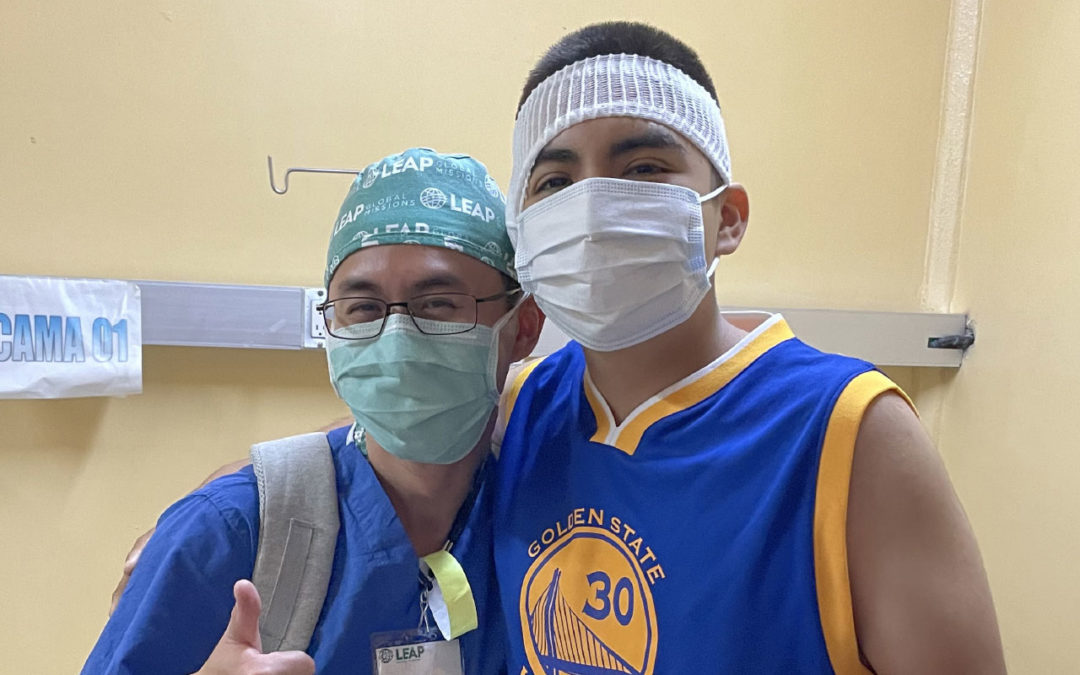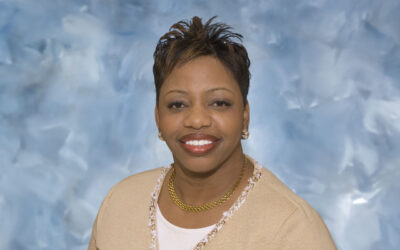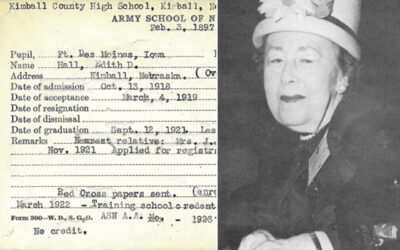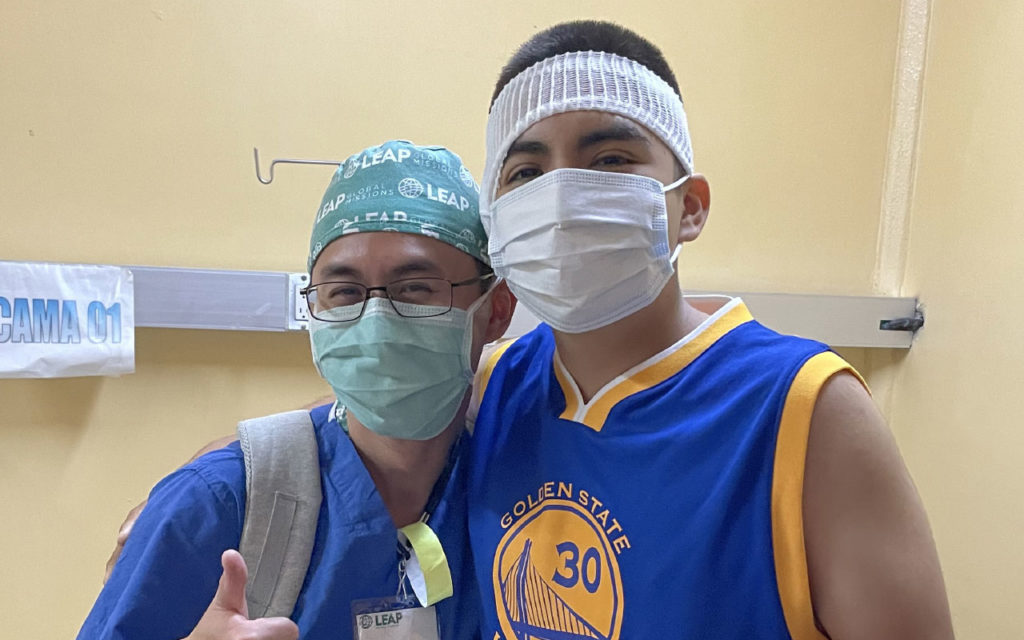
Charlie Lin and an ear surgery patient give a thumbs up.
By Matt Skoufalos
Charlie Lin has spent the past two years of his health care career as a pediatric otolaryngology nurse practitioner at Stanford Children’s Hospital in Palo Alto, California, and is a clinical assistant professor in the Stanford University Physician Assistant program. Lin is also an adjunct faculty member at the RN First Assistant program at Delaware County Community College in Media, Pennsylvania, and chairs two specialty assemblies within the national Association of periOperative Registered Nurses (AORN), where he made the organization’s Forty Under 40 list.
Racking up that long list of accomplishments is a considerable achievement for any nurse, let alone one who’s still in his thirties. But what it took Lin to get there, and what he experienced along the way, makes those achievements all the more remarkable.
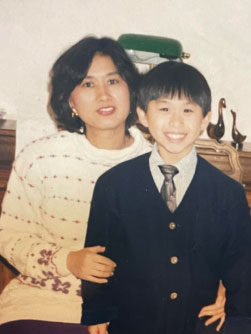
Charlie Lin lost his mother to breast cancer which inspired him to become a nurse.
Lin was born in Taiwan, and grew up in the United States. At 13, he lost his mother to breast cancer, and became an orphan. According to his late mother’s wishes, Lin was placed under the care of an aunt and uncle in Plano, Texas, who made it clear to him that at age 18, he would be required to find his own way in the world. At a time when many of his peers were still concerned with the trivialities of youth, Lin needed to dedicate himself to a career path that would allow him to forge his own future.
He settled on nursing because his high school offered the opportunity to participate in clinical rotations and test for his nursing assistant and emergency care assistant certifications. Lin, who planned on attending medical school to become a neonatologist, thought he’d earn a nursing degree while applying to medical school so that he’d have a nursing career to work while he continued his studies. While many of his friends were working in food service or retail, he was holding down a hospital job as a patient care technician, earning more and working fewer hours to do it.
“It was really funny, but in light of all of it, it was great exposure, a great experience, and I realized I could handle blood, guts and gore,” Lin said of his high-school clinical rotations.
Along the way, life presented him with an additional complication. Throughout his teenaged years, Lin struggled with what his doctors told him was a benign growth on his neck. But it wasn’t until after high school, when his family sent him to Taiwan for a thorough physical evaluation that Lin was diagnosed with thyroid cancer.
The process was overwhelming; when the physicians in Taiwan aspirated Lin’s neck with a needle, they discovered he was facing papillary thyroid cancer, and required a thyroidectomy. Lin opted for a partial removal of his thyroid, but a subsequent examination revealed that he’d need to excise the entire organ. Eighteen hours after the second surgery, he was rushed back to the hospital after his jugular vein opened up.
“I didn’t lose consciousness, so I knew everything that was going on,” Lin said. “I knew more than the average 18-year-old kid, but that didn’t make it any less scary.”
So for the first two years of college, Lin battled symptoms that raged and subsided, underwent repeated radioactive iodine treatments, and waited while his thyroid replacement medication was better regulated. He leaned on the grants and scholarships he’d earned for college to supplement the costs of his treatments and physician follow-up visits. As much as any of that, however, he leaned harder on his social circle from high school and church.
“I had a great group of friends,” Lin said. “They were super-supportive.”
Even when his health issues were in the rearview mirror, Lin still faced challenges to his plan of becoming a physician. At the University of Texas-Arlington, the demands and baseline criteria kept him out of nursing school when he first applied. Lin changed majors, angling to become a physician assistant, but then re-thought it, and decided to give nursing another shot. He was accepted into a program at West Texas A&M University in Canyon, Texas, which Lin described as “the middle of nowhere.”
“In hindsight, it could not have been better for me,” he said. “In that small environment, I had more opportunity to focus on my studies than if I’d stayed in Dallas, where a lot of my friends were. That small group made it easier for me to get to know my professors and be able to learn from them. It even helped when I went back for my master’s to become a family nurse practitioner. Five years after graduation, some faculty still remembered me as a student.”
Lin graduated with honors, as class president, and earned a place in the international honor society for nursing. His clinical rotations, in Amarillo, Texas gave him exposure to the kinds of cases that were common in rural areas – like tractor injuries and falls – but less so in urban emergency rooms, and he credits the experience with helping prepare him for dealing with the variety of demands his first assignment as a trauma/ER nurse presented.
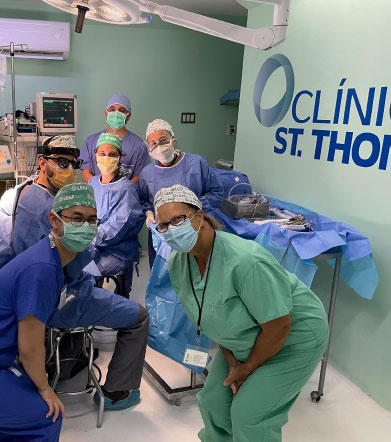
Charlie Lin and a team of health care professional performed surgeries as part of a medical mission trip.
A couple years later, Lin joined a medical mission trip to Haiti as a recovery room nurse, and found his understanding and love of the surgical world deepen so much that he picked up a job at a surgery center. Three months in, when the facility needed someone to step into the OR and be an otolaryngology nurse, he learned to expand his pre-op and recovery skills to support those assignments — and he did most of it on his own, until he connected with his local AORN chapter.
“I had to learn all the equipment by myself; there was no one to train me,” Lin said. “On the days that I was there, I didn’t have back-up. So, I found an AORN chapter in North Texas, and got hold of some resources there. I got to network with a lot of nurses, and after I joined my local chapter I saw this bigger net.”
Lin’s love for otolaryngology stayed with him when he accepted a position in Connecticut, spending a year and a half as a nurse practitioner and RN first assistant in an academic adult otolaryngology practice. Afterwards, he continued in the otolaryngology field, and began taking on pediatric patients at his current assignment in Palo Alto.
“Now I am able to do certain procedures myself without physician oversight because I’ve demonstrated my competence to do so,” Lin said. “I assist with a lot of ear reconstruction; a lot of pediatric airways, especially tracheostomy for babies. I see a lot of general ENT patients as well as patients with chemosensory dysfunction; I might also see ear reconstruction patients for post-op wound care checks.”
“I have a pretty interesting type of practice at this point,” he said. “Our tracheostomy families in our hospital have come to know me, and when there’s a problem, they know they can call me because they know I will likely respond more quickly, or they’ll see me in clinic sooner. Many of the families call me ‘Uncle Charlie.’ I have a great relationship with the family because I see these patients whenever they’re admitted in the hospital or in my clinic.”
When he’s not working, or teaching, or coaching some of his former students, Lin is still involved in medical missions (he’s done more than 20 in all, and will lead another this month), and his church. He enjoys playing volleyball, singing, food adventures, travelling, Broadway plays and volunteering.
“I went into this with the intention of being a provider,” he said. “I want to take care of my patients. All in all, I still get to keep doing what I want to do. Professionally, I don’t think there’s much else but to inspire others to chase their aspirations.”




